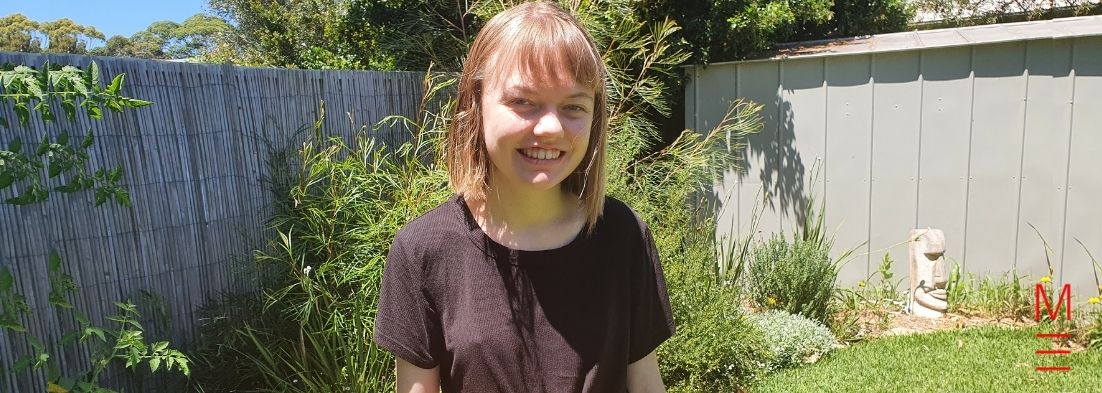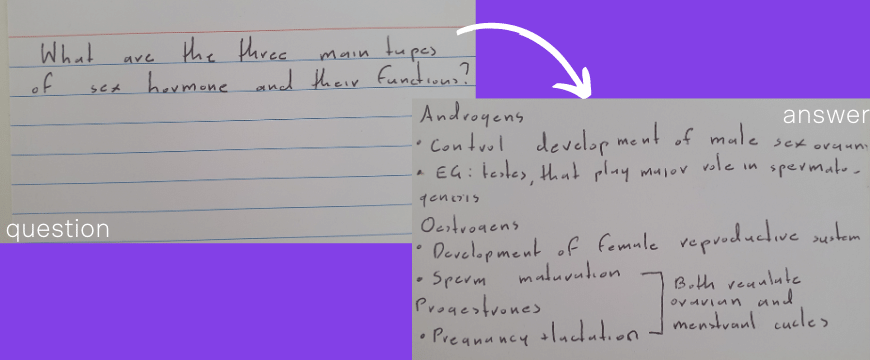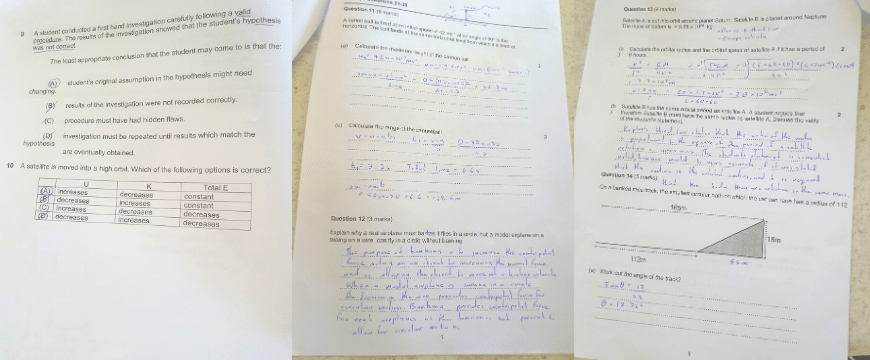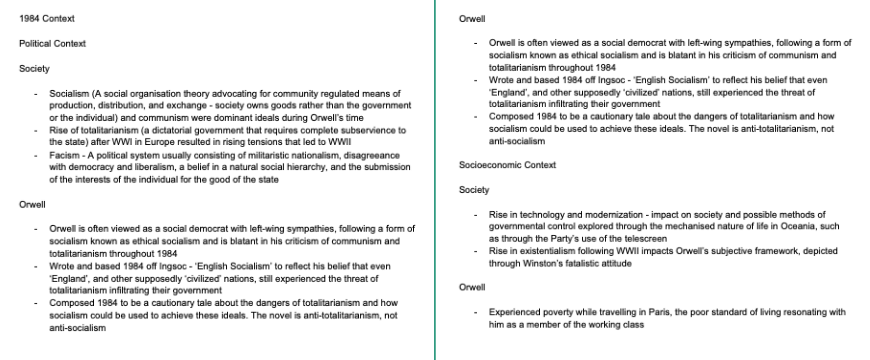Year 12 Common Module Study Guides
Learning methods available
Select a year to see available courses
Struggling to manage your stress and anxieties about school? Well, in this article, Isabella shares her experience and top advice to help you overcome this!

Join 75,893 students who already have a head start.
"*" indicates required fields
In this article, St Peter’s Anglican College graduate and Matrix+ Scholarship Student, Isabella, shares her top tips on how to use your passions and goals to overcome stress and anxieties.
Isabella Heslop
St Peter’s Anglican College Broulee
Medicine at James Cook University
I am quite the introvert, so most of my passions are solitary activities such as reading, puzzles, piano, yoga, or anything that keeps me moving or thinking since I am a natural at boredom. Occasionally, I also play board games or go for walks with friends, as I reside in a small town on the coast of New South Wales, so there are plenty of beautiful beaches and forest areas to explore.
While many people I know would consider me to be the stereotypical ‘smart girl’, I mostly see myself as determined.
In reality, I am nowhere near gifted but interested in what I am learning and spend a lot of time revising and working on assessments. Many people do not have this same passion, and I am grateful that it drives my studies as it allows me to focus on the content without continually worrying about the result in the HSC.
Still, I do care about my results, and doing well provides a little extra motivation when I might feel tired or overworked.
The school environment can be challenging for anyone – whether you experience conflict with peers, or struggle with academics. Difficulties are something that everyone faces, even those who seem most together.
School is often a place where I am plagued with anxiety due to communication difficulties and sensory overload. And, for a long time, this inhibited my ability to learn.
Going to school was enough of a challenge in and of itself. When I was actually there my mind became clouded with worrying about break times featuring screaming children and indecipherable conversations.
My saving grace was a final goal; to get accepted into a medical course when I go to University.
Due to this, I absolutely recommend having something that drives you through your studies in the final years of school.
Keeping this goal in mind during the year, and even writing a reminder of why you are studying hard in an accessible area, can boost your motivation to work and increase the efficiency of your study.
Obviously, while a final goal does help you focus, it did not make my struggles all magically disappear.
Strategies I used that can be applicable to nearly any situation are:
For me, I involved myself in social activities to improve my ability to socialise. This helped decrease my anxiety of not being able to cope in these situations.
However, the challenge you are facing does not have to be identical to mine to use this strategy.
If Maths is difficult for you, do more practice questions, even if it feels overwhelming at first.
If you are finding it difficult to form a work-life balance in your day, experiment with different schedules and see what works best for you.
This is especially important during Year 11. The Matrix+ program can assist with this through the practice questions and activities it provides.
Often, people are more willing to help and accommodate for your needs than you would assume.
If you let your school, family, or friends know that you are struggling, you can often resolve a lot of issues.
For example I had to let my teachers know that I need accommodations during English speeches.
Don’t be afraid to ask teachers for assistance in classes that you are struggling with, or inquire the Matrix+ teachers about certain topics you need clarification with.
It is a lot easier than trying to fix all your problems alone.
Personally, one way I managed my anxiety about school is to knowing as much as possible about what is happening during the day.
This gave me a sense of control.
This involves:
Matrix+ has especially helped me in the final aspect by providing materials I can review before the content is taught in class.
However, other resources vital to my day are a diary, computer, or phone, all of which I can set reminders with so no stressful surprises appear.
Get ahead with Matrix+ Online
Expert teachers, detailed feedback and one-to-one help. Learn at your own pace, wherever you are.
While I studied music up till Year 11, I decided to cease lessons and only play for pleasure during my senior years to reduce my workload.
For the same reason, when transitioning to Year 12, I gave up Extension 1 Maths and Extension English.
While I thoroughly enjoyed the subjects, I believe in not making so many commitments that it impairs the quality in which these are fulfilled. So by dropping these subjects, I am now able to better focus on my other subjects.
I find Biology to be the easiest science subject for a person dedicated to their work and puts effort into studying. This is because the concepts are not too difficult to understand and remembering the content can provide the basis to answer almost any question since the subject is less application-based than the other sciences.
Like Biology, the concepts are not overly complicated, yet Chemistry requires being meticulous in answering questions. You need to take a lot of care and think critically about everything you do in a chemistry paper or assignment to make sure you don’t make small errors that could cost marks. Since I like to be thorough, it puts me in a good space to think about questions in this subject.
Honestly, there are no secrets to succeeding at maths; the only way to do well is to consume as many practice questions as possible. During the term, most of my study time is spent just doing practice questions over and over until I can do every type barely needing to think about it.
My biggest issue with English is the time it consumes. I wouldn’t say I am awful at the subject, but I wouldn’t get an excellent mark on my first four drafts. Composing, editing, and recomposing multiple times is required to produce a satisfying final piece.
In Year 11, Physics was probably my weakest subject, especially Modules 1-2. Yet this year, I have put a lot of effort into understanding the concepts thoroughly and thinking in a meticulously analytical way when answering questions to ensure I don’t make any simple errors.
So far, it has probably also been my favourite subject, as I find the content for Modules 7-8 incredibly fascinating.
Matrix+ is a fantastic program in that it provides so much detail yet covers the concepts in a manner that is easy to understand.
I used Matrix+ for both Chemistry and English, and both courses were incredibly beneficial.
The English course provides so many resources for the prescribed texts to deepen your understanding. In contrast, the written submissions offer constructive feedback for improvement in writing that can be applied in assignments and the HSC. The chemistry course also provided excellent revision, or sometimes an introduction to the topic, and there were plenty of practice questions to ensure an understanding of the concepts.
Overall, it makes study efficient and getting quality feedback easy.
I don’t have a study timetable that works on a term, weekly or monthly level. Still, I use the principle that I allocate an even amount of study time each afternoon to every subject I had that day, and spend half of the allotted study time to do any assignments I might have. During this time is also when I would engage in the Matrix+ content for Chemistry and English.
With this method, I never find that I need to make sure I am prepared for upcoming exams or assignments until a few days before because I always have the work done early and have done plenty of revision.
On days where I am feeling less motivated; however, I always set a specific goal to have done in each study session to ensure that I am not wasting any time.
During study sessions for Maths, the textbook would initially be the primary resource to learn the content. Once I have a good understanding of the text, practice papers are virtually the only resource I use, and any issues I have with a question I make sure to clarify and write down to reattempt later.
For English, most of my study is through Matrix+, while my additional time focuses on homework and assignments.
I study Chemistry and Physics through the same method; understand the content, and then use practice questions, but with Biology, I mostly try to recall as much as I can about each topic and write it down, before writing study cards for anything I forget. That way, I ensure that I remember all the content.

The holidays are a great way to get on top of assignments and work for when school goes back, but resting is also essential to prevent burnout.
I always allocate some part of the day to do something enjoyable that isn’t school work and have regular breaks for food and water to keep my energy levels up during the study sessions.
Again, I don’t have a study schedule for the holidays, but think about what I feel like doing on the day and if there is anything I need to work on, making small goals to achieve in each study session.
Usually, during the holidays, I focus mostly on Science subjects, so I have more time during the term to study for maths and English.
This involves briefly going over the term’s content for these subjects, while also ensuring I have any assignments done that are due during that term. If I have additional time following that, I start looking at the content for Maths and read the prescribed text for English a few times.
A gigantic weakness I have with my study habits is procrastinating certain subjects by focusing on other ones. I get so focused on doing one thing in a topic that I don’t consider the other responsibilities that need my attention.
Usually, to combat this, I do the thing I don’t want to do in small increments, such as for thirty minutes to one hour, followed by the subject that I am more interested in working on for the same amount of time. Often, this results in me becoming so focused on what I am doing that I get quite a significant amount of work done on that subject and get so engrossed in the content I keep working.
If you are like me, the word ‘sport’ strikes a deep fear within your heart, yet this does not mean you can’t stay healthy!
Everyone has some form of exercise they can find enjoyment in, and for me, that is yoga, bike riding, and walking, as you can spend time appreciating the outdoors while you do these activities. Exercise is also an effective way of de-stressing and is essential when you spend a lot of time studying at a desk.
Step 1 – Preparation: Know the syllabus like the back of your palm, especially for content-heavy subjects such as the sciences. I printed out a copy of the syllabus for each subject and kept it in the front of my folder to continually refer to it. Also, make sure that you keep on top of your study notes.
Step 2 – Resources: For all subjects, the best starting point is your textbook. I had two textbooks for Maths and one for each of the Sciences. I would read the textbook before class, make notes, and add to what was learnt in class. Then, if you look at the syllabus and feel you are missing something, do some research and watch videos to make sure your study notes are fleshed out. For English, most of my notes came from research on the internet.
Step 3 – Practise!: Once you have a grasp on the content, the most efficient way to study for Maths, Chemistry, and Physics is attempting past papers, especially under timed conditions. Do the paper to the best of your ability, and keep a log of the mistakes you make.
Biology is very content-heavy, so I found that the best way to study is rewriting notes as best as possible without referring to your set of study notes, and then going back and making flashcards for all the concepts you had forgotten.

For Year 11 I didn’t do a whole lot of study for English; I spent most of my time on assignments.
However, during Term 4 I started using the Matrix videos to improve my writing by watching the theory and completing the respective homework tasks. I also used the question boards to inquire about assignments and wrote any feedback in my English book which I then revised any time I went to do a writing activity, which ensures that I am always learning from past mistakes.
Most note-taking I do under subheadings with dot points on google docs, and then print these out and stick into my workbook.

For Chemistry, I often use the textbook and videos to compile a basic understanding of the content before it is taught in class, before supplementing any notes with what is taught in class.
I then rewrite these into my study notes book and use the Matrix+ resources and videos as revision and additional questions I find online.
Any mistakes I make when doing practice questions I record in a mistake logbook, and go back over these close to the exam period. Usually, I compile notes as dot points under subheadings, including any diagrams possible.
While I have had academic achievements over the last year, including topping Biology, Chemistry, Physics, English extension, and English advanced, probably my most significant achievement was going for school prefect.
I did not get a position, and most would call it a colossal failure, it was the first time I had ever been in an interview setting which was incredibly difficult for someone with anxiety.
So by doing that interview, I pushed myself in the area of life that I find most challenging.
My main regret is working to the point that I lost my passion for what I was doing. This happened in Term 3, and I became incredibly distraught because I focused on my marks and ranking first in my class.
This singular focus only hurt my marks.
However, over the holidays, I was able to have a bit of a break and gained my interest back, and Term 4 turned out a lot better.
Work hard doing whatever you are passionate about, that is when you will see the results.
Work hard – I am not saying you need to dedicate your life to studying maths, or burying your head in physics textbooks, but work hard at what you enjoy. Whether that be art, physical education, chemistry, or a VET course, it doesn’t matter, because your future should be about your passions.
Take care of yourself – Nothing is worth a mental breakdown. I always finished study early on Wednesday afternoon and knew when I was too stressed to keep working. There is no point studying if you are in too bad a mental state to absorb the information, do something else.
Take your opportunities – Year 12 is even more intense than Year 11. Make sure you spend time doing things outside of school. Be involved in committees, sports groups, music lessons, whatever you are into; it is vital to prevent burnout before your final year.
Just study – I spend a LOT of time studying, but I don’t study ALL the time. It is physically impossible to do this and not have a breakdown, not to mention that your time spent studying will be so much less beneficial. Be honest with yourself, and take on a reasonable workload.
Base your self-worth on marks – Yes, if you get good grades in Year 11 you have a better chance of getting them in Year 12, but if something happens and you fall hard on an assignment or exam, it counts for nothing in the long run. The critical aspect of Year 11 is learning from the experience so that when it matters in Year 12, you don’t fall short of your goals.
Be a hermit – It is easy to fall into a rut of not leaving the house or socialising when you spend a lot of time studying, but staying inside and not communicating with others is bad for mental health. Push yourself, even if it means just going outside for a five-minute walk or seeing a friend for an hour, it may not feel like it at the time, but you are doing yourself a favour.
Written by Guest Author
We have regular contributions to our blog from our Tutor Team and high performing Matrix Students. Come back regularly for these guest posts to learn their study hacks and insights!© Matrix Education and www.matrix.edu.au, 2023. Unauthorised use and/or duplication of this material without express and written permission from this site’s author and/or owner is strictly prohibited. Excerpts and links may be used, provided that full and clear credit is given to Matrix Education and www.matrix.edu.au with appropriate and specific direction to the original content.